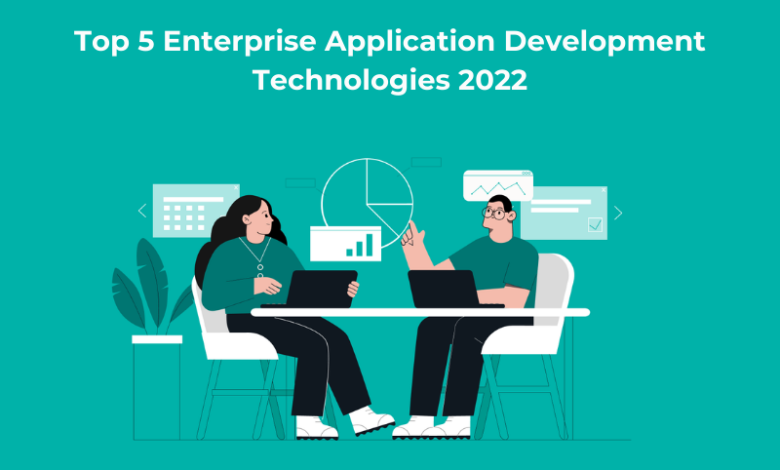Top 5 Enterprise Application Development Technologies 2022

Technology is always evolving, and the software development industry is no exception. In order to stay ahead of the curve, it’s important for app developers to be aware of the latest technological trends. Here are the top 5 technologies that will dominate enterprise application development in 2022. These technologies have been selected based on their current rate of adoption and projected growth. We’ve also included some detail on each so you can be sure to make the most informed decision for your business.
Best Enterprise App Development Technologies 2022
So, what are the best Enterprise Application Development technologies in 2022. We will go through the top 5 from Low code, Artificial Intelligence, Blockchain, IoT to AR & VR.
1. Low Code Development Platforms
Low code development platforms provide a drag-and-drop interface for creating applications, making them ideal for businesses that want to develop simple apps quickly and without requiring a lot of coding knowledge. Some of the leading low code development platforms include OutSystems, Appian, and Mendix. In addition to being easy to use, these platforms also offer a variety of features that can be tailored to the needs of your business.
For example, OutSystems offers pre-built application templates, while Appian provides tools for building workflow-based applications. As the demand for custom business applications continues to grow, low code development platforms are expected to gain popularity.
2. Artificial Intelligence & Machine Learning
Artificial intelligence (AI) and machine learning are two of the most popular enterprise application development technologies. AI can be used to develop applications that can autonomously perform tasks, such as image recognition or voice recognition. Machine learning can be used to develop applications that improve over time by learning from data.
These technologies are often used together to create more intelligent and responsive applications. In the next few years, we expect AI and machine learning to become even more widely used in enterprise application development.
3. Blockchain Technology
Blockchain is a distributed database that allows multiple parties to securely store and share data. The most well-known application of blockchain is Bitcoin, but the technology has potential implications for a wide range of industries.
For example, Blockchain could improve supply chains or make provenance information more transparent. Some of the leading blockchain platform providers include Ethereum, IBM Blockchain, and Microsoft Azure Blockchain. As the world becomes increasingly digitized, Blockchain is expected to become more prevalent in enterprise application development.
4. Internet of Things (IoT)
The Internet of Things (IoT) is one of the hottest topics in enterprise application development right now. There are an estimated 22 billion IoT devices worldwide by 2022. That’s a lot of potential data points that businesses can collect and use to improve their operations.
IoT can be used for things like asset tracking, predictive maintenance, & energy management. It’s also becoming increasingly popular for customer-facing applications like connected cars and smart homes. With so much potential, it’s no wonder that IoT is one of the top technologies to watch in enterprise application development.
5. Augmented Reality/Virtual Reality
Augmented reality (AR) and virtual reality (VR) are two of the most promising technologies on the horizon. AR can be used to provide enhanced experiences for users, while VR can be used to create completely immersive environments.
Both technologies have the potential to revolutionize business interactions. In addition, both AR and VR are becoming more affordable and accessible, making them viable options for businesses of all sizes. So if you’re looking to stay ahead of the curve, keep an eye on these two technologies in the coming year.
To get the best out of Enterprise App Development Technologies, hire android app developers and seek professional assistance from them.
Challenges Faced in Enterprise Application Development
Despite the numerous benefits that enterprise applications offer, development can be fraught with challenges. Here are some of the key challenges faced by enterprises when developing apps:
- Lack of standardization: Because enterprise applications are often developed by third-party vendors, there can be a lack of standardization across different platforms and devices. This can make it difficult to ensure compatibility & interoperability between the different systems.
- Security concerns: Enterprise applications handle sensitive data, so security is a major concern. There are risks associated with data breaches, unauthorized access, and malware infections. Enterprises need to have robust data protection measures in place.
- High costs: Developing enterprise applications can be costly, requiring specialized skills & hardware. Additionally, enterprises need to purchase licenses for enterprise software, which can add to the overall cost.
- Complexity: Enterprise applications are often complex, due to the large amount of data they process and the number of features they offer. Testing and developing them can be challenging as a result.
- Time-consuming: Developing enterprise applications can take a long time, due to the complexity involved. This can delay the rollout of new features and updates, which can impact productivity.
Future of Enterprise App Development
It’s no secret that enterprise application development is undergoing a major transformation. The rise of new technologies like cloud computing, containers, and microservices has changed the way we build and deploy applications. And, as enterprises adopt these new technologies, they’re also rethinking the way they develop applications altogether.
What does this all mean for the future of enterprise application development? Here are three key trends that are shaping the future of enterprise app development:
1. Cloud-native Application Development
Applications developed with cloud-native technology take advantage of the unique characteristics of cloud computing environments. Cloud-native apps are designed to be highly scalable and resilient, and they’re often deployed in a microservices architecture.
2. Containers & Microservices
Containers and microservices are two of the most important technologies driving the shift to cloud-native application development. Moreover, containers let developers package apps with their dependencies and deploy them anywhere, on-premises or in the cloud. Microservices are a way of breaking down a monolithic application into smaller, independent services that can be deployed and scaled independently.
3. DevOps
Using DevOps, mobile app developers & operations teams can enhance communication and collaboration to shorten the software development life cycle. DevOps is particularly well suited for cloud-native applications, which are typically deployed in short cycles and require close coordination between development and operations.
These are just a few of the trends that are shaping the future of enterprise application development. As enterprises continue to adopt new technologies and rethink the way they develop applications, we can expect to see even more changes in the years to come. Let’s watch and wait to witness what the future holds for us.
Last Say
In this post, we looked at the top 5 enterprise application development technologies that will be popular in 2022. We discussed how these technologies are changing and adapting to the business needs. Additionally, we discussed some challenges that enterprises face when it comes to deploying new applications.
If you are looking for your next enterprise application development project, get assistance from a top Enterprise app development company. Their team of developers can help you with the latest technologies. All in all, they will help you create your dream project with minimal efforts and low investment too.
Author’s Bio
He/She is an expert Mobile App Developer at MobileCoderz, a reputable Mobile App Development Company. With 8+ years of expertise, he/she has worked with SMEs to large established organizations. Apart from such professional prowess, he/she loves to workout and is a national level football player.




